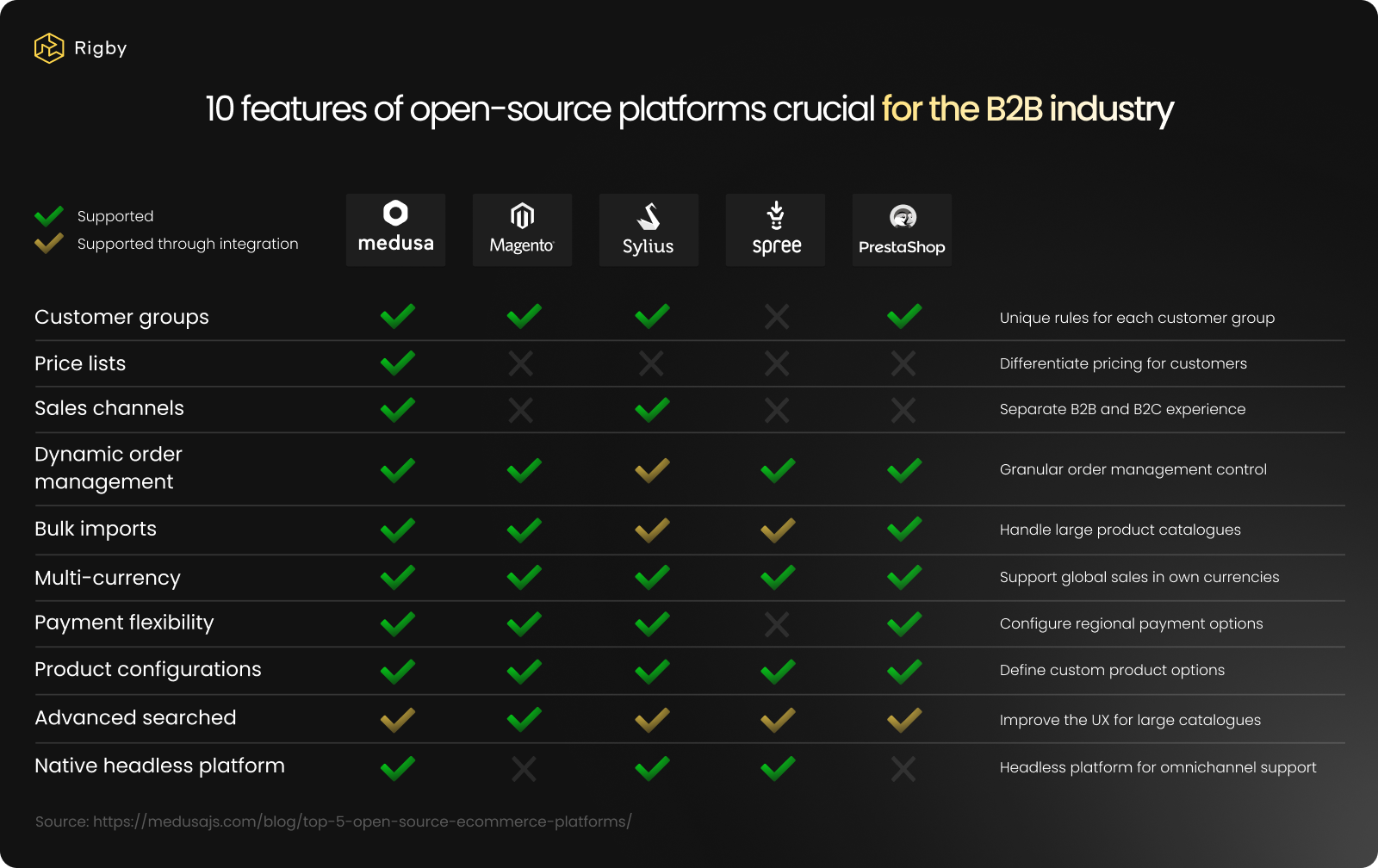Will Medusa Be Suitable for B2B?
By Karolina Jakubowicz
By Karolina Jakubowicz

Many B2B companies face the challenge of finding the right eCommerce platform that meets their unique needs and allows for effective online business management.
If you've come across this article, you've probably heard about the Medusa platform, which has quickly gained popularity and become a leader in the ranking of the best open-source solutions available on the market (Source).
In this article, we will analyze whether Medusa is indeed a suitable option for B2B companies and whether it can compete with other open-source solutions. I hope that after reading this, I can help you make the right decision in choosing the appropriate eCommerce platform for your business.
Before we dive into whether Medusa is effective in B2B, let's take a closer look at the platform itself.
Medusa.js is an open-source headless eCommerce engine that allows B2B companies to create and manage their online stores. Unlike many existing commerce platforms, Medusa in B2B offers a flexible and open architecture that allows customization of the store to individual business needs. This enables companies to create personalized solutions that perfectly fit their business model.
Furthermore, Medusa is continually evolving. Its creators deliver new features and updates every week to ensure the continuous development of technology and a breath of fresh air in the market. It is undoubtedly a forward-looking solution that allows you to stay ahead of the competition both technologically and functionally.
If you want to learn more about Medusa's technology, I encourage you to read our article: The Future of eCommerce: Why Invest in Medusa.js Technology?
One of the key questions we need to ask is whether Medusa can bring benefits to businesses operating in the B2B model.
The answer is - yes.
As a B2B tool, Medusa offers many features that can be extremely useful for wholesale businesses or those serving business clients. Here are some of them:
Customer Groups: Medusa.js supports customer groups "out-of-the-box." This means you can create groups of customers with similar characteristics and define individual logic for them, such as special prices, promotions, or access levels.
Sales Channels: Medusa supports multichannel sales, allowing you to separate customer experiences. This means you can offer different products and deals on the website than in the app.
Dynamic Order Management: Medusa offers dynamic order management features that allow you to create new orders, integrate payments, define shipping addresses, or change order status.
Bulk Import: Medusa allows bulk import of product lists, prices, and other store elements from one platform to another. If you work with a system where, for example, the product list is downloaded as a CSV file, you can mass import it into Medusa.
Design Flexibility: With Medusa.js, you can enjoy full design freedom to bring your unique vision to life. From the ordering process to the cart, every element can be customized to align with your company's business model.
Speed and High Scalability: Speed is the new currency. Medusa.js guarantees lightning-fast loading times and scales with your growth, ensuring your customers never encounter delays. Introduce products, run campaigns, or add new features faster than ever before.
Support for Multiple Currencies, Regions, Shipping Options, and Payment Gateways: Medusa offers built-in support for popular currencies, regions, and payment gateways. It also supports shipping integrations with major carriers, allowing merchants to streamline their shipping processes. These can vary depending on the region, allowing customers to see the most popular payment and delivery methods in their area. This flexibility allows businesses to choose options that best suit their customers' needs.
Advanced Search and Personalization: Medusa allows the implementation of advanced search and store offer personalization through integrations with search engines like Algolia. This allows customers to find products that best meet their expectations, enhancing their shopping experience and saving time on searching.
Using open-source platforms provides full control over the source code, allowing for easy customization to individual needs. They also focus on a modular structure, enabling the creation of advanced features and integrations.
To effectively compare eCommerce platforms, we focused on 10 features crucial for the effective operation of B2B businesses. The infographic below, taken from the Medusa website, illustrates these features and how each of the analyzed platforms handles them.
If you'd like to delve into the technological aspects of Medusa, be sure to check out our comparison - WooCommerce vs. Shopify vs. Medusa: The Best Platform in 2023 is...

Medusa has the potential to adapt to small, medium, large, and even very large businesses, offering functionalities and benefits that support the specific needs of each type of enterprise.
In small businesses, where time and budget resources are often limited, Medusa offers simple configuration, ease of use, and quick implementation. If you anticipate the growth of your store, this technology will help you build a fully customized store for you and your customers.
In medium-sized enterprises, where an online presence becomes more desirable and competition stronger, advanced features of Medusa, such as integrations with external systems or personalization of shopping experiences, allow fuller control over eCommerce-related operations. Medusa can also assist medium-sized companies in building customer relationships through audience segmentation and adapting the platform to their requirements.
In large enterprises, where complex organizational structures and large amounts of data can pose a challenge, Medusa meets these needs through its advanced features. The platform offers support for a wide range of third-party integrations, including payment gateways, shipping service providers, and various eCommerce tools. This allows large companies to connect multiple services and manage them efficiently. Moreover, thanks to its modular architecture, Medusa can effectively handle growing website traffic, extensive product catalogs, and the accumulation of a large amount of customer data.
In summary, Medusa.js is not just another eCommerce platform. It is a solution designed to effectively meet the challenges of modern online commerce, regardless of the size of the enterprise or the needs of customers.
Patyna, a leading name in the vintage market, has been a destination for thousands of users seeking high-quality vintage furniture from a wide range of sellers for years.
As the business developed and technology evolved, several challenges arose. Inherent limitations of the platform began to hinder the company's growth and its ability to meet changing expectations of both customers and sellers.
Transferring over 30,000 products and details from over 2,000 sellers present on the platform was no small feat. We wrote a dedicated script to ensure a smooth transition from WooCommerce to Medusa.js, taking care of data integrity and consistency.
Medusa.js was adapted to the multi-seller business model. From managing extensive product lists to handling intricate seller details, it provided a robust and scalable solution. Now the platform operates faster, without disruptions, and also has custom functionalities that meet the company's and its customers' requirements.
You can read more about this project in our case study.
Medusa is an eCommerce platform that is gaining increasing recognition in the B2B industry. Its flexibility, scalability, and customization capabilities allow businesses serving business clients to adapt it to their unique needs.
However, before making a final decision, it's always worth conducting a thorough analysis and comparison with other available options to choose the solution that best fits the specific business.
If you still have any questions or would like to see Medusa in action - Schedule a free demo presentation with us and discover the key to eCommerce success.
But how to implement maintenance mode in Next.js? Is it as easy as configuring a plugin on WordPress for a few minutes? Of course it is!
Magento, compared to Medusa, may lead to higher long-term costs due to its licensing model and the risk associated with the gradual decline in the popularity of the PHP language...